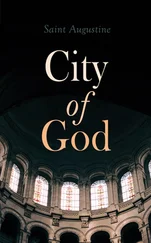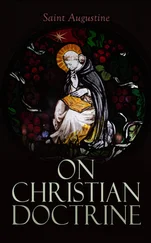Saint Augustine - The City of God, Volume II
Здесь есть возможность читать онлайн «Saint Augustine - The City of God, Volume II» — ознакомительный отрывок электронной книги совершенно бесплатно, а после прочтения отрывка купить полную версию. В некоторых случаях можно слушать аудио, скачать через торрент в формате fb2 и присутствует краткое содержание. Жанр: unrecognised, на английском языке. Описание произведения, (предисловие) а так же отзывы посетителей доступны на портале библиотеки ЛибКат.
- Название:The City of God, Volume II
- Автор:
- Жанр:
- Год:неизвестен
- ISBN:нет данных
- Рейтинг книги:4 / 5. Голосов: 1
-
Избранное:Добавить в избранное
- Отзывы:
-
Ваша оценка:
- 80
- 1
- 2
- 3
- 4
- 5
The City of God, Volume II: краткое содержание, описание и аннотация
Предлагаем к чтению аннотацию, описание, краткое содержание или предисловие (зависит от того, что написал сам автор книги «The City of God, Volume II»). Если вы не нашли необходимую информацию о книге — напишите в комментариях, мы постараемся отыскать её.
The City of God, Volume II — читать онлайн ознакомительный отрывок
Ниже представлен текст книги, разбитый по страницам. Система сохранения места последней прочитанной страницы, позволяет с удобством читать онлайн бесплатно книгу «The City of God, Volume II», без необходимости каждый раз заново искать на чём Вы остановились. Поставьте закладку, и сможете в любой момент перейти на страницу, на которой закончили чтение.
Интервал:
Закладка:
2. Of the children of the flesh and the children of the promise.
There was indeed on earth, so long as it was needed, a symbol and foreshadowing image of this city, which served the purpose of reminding men that such a city was to be, rather than of making it present; and this image was itself called the holy city, as a symbol of the future city, though not itself the reality. Of this city which served as an image, and of that free city it typified, Paul writes to the Galatians in these terms: "Tell me, ye that desire to be under the law, do ye not hear the law? For it is written, that Abraham had two sons, the one by a bond maid, the other by a free woman. But he who was of the bond woman was born after the flesh, but he of the free woman was by promise. Which things are an allegory: [133]for these are the two covenants; the one from the mount Sinai, which gendereth to bondage, which is Agar. For this Agar is mount Sinai in Arabia, and answereth to Jerusalem which now is, and is in bondage with her children. But Jerusalem which is above is free, which is the mother of us all. For it is written, Rejoice, thou barren that bearest not; break forth and cry, thou that travailest not: for the desolate hath many more children than she which hath an husband. Now we, brethren, as Isaac was, are the children of promise. But as then he that was born after the flesh persecuted him that was born after the Spirit, even so it is now. Nevertheless, what saith the Scripture? Cast out the bond woman and her son: for the son of the bond woman shall not be heir with the son of the free woman. And we, brethren, are not children of the bond woman, but of the free, in the liberty wherewith Christ hath made us free." [134]This interpretation of the passage, handed down to us with apostolic authority, shows how we ought to understand the Scriptures of the two covenants—the old and the new. One portion of the earthly city became an image of the heavenly city, not having a significance of its own, but signifying another city, and therefore serving, or "being in bondage." For it was founded not for its own sake, but to prefigure another city; and this shadow of a city was also itself foreshadowed by another preceding figure. For Sarah's handmaid Agar, and her son, were an image of this image. And as the shadows were to pass away when the full light came, Sarah, the free woman, who prefigured the free city (which again was also prefigured in another way by that shadow of a city Jerusalem), therefore said, "Cast out the bond woman and her son; for the son of the bond woman shall not be heir with my son Isaac," or, as the apostle says, "with the son of the free woman." In the earthly city, then, we find two things—its own obvious presence, and its symbolic presentation of the heavenly city. Now citizens are begotten to the earthly city by nature vitiated by sin, but to the heavenly city by grace freeing nature from sin; whence the former are called "vessels of wrath," the latter "vessels of mercy." [135]And this was typified in the two sons of Abraham,—Ishmael, the son of Agar the handmaid, being born according to the flesh, while Isaac was born of the free woman Sarah, according to the promise. Both, indeed, were of Abraham's seed; but the one was begotten by natural law, the other was given by gracious promise. In the one birth, human action is revealed; in the other, a divine kindness comes to light.
3. That Sarah's barrenness was made productive by God's grace.
Sarah, in fact, was barren; and, despairing of offspring, and being resolved that she would have at least through her handmaid that blessing she saw she could not in her own person procure, she gave her handmaid to her husband, to whom she herself had been unable to bear children. From him she required this conjugal duty, exercising her own right in another's womb. And thus Ishmael was born according to the common law of human generation, by sexual intercourse. Therefore it is said that he was born "according to the flesh,"—not because such births are not the gifts of God, nor His handiwork, whose creative wisdom "reaches," as it is written, "from one end to another mightily, and sweetly doth she order all things," [136]but because, in a case in which the gift of God, which was not due to men and was the gratuitous largess of grace, was to be conspicuous, it was requisite that a son be given in a way which no effort of nature could compass. Nature denies children to persons of the age which Abraham and Sarah had now reached; besides that, in Sarah's case, she was barren even in her prime. This nature, so constituted that offspring could not be looked for, symbolized the nature of the human race vitiated by sin and by just consequence condemned, which deserves no future felicity. Fitly, therefore, does Isaac, the child of promise, typify the children of grace, the citizens of the free city, who dwell together in everlasting peace, in which self-love and self-will have no place, but a ministering love that rejoices in the common joy of all, of many hearts makes one, that is to say, secures a perfect concord.
4. Of the conflict and peace of the earthly city.
But the earthly city, which shall not be everlasting (for it will no longer be a city when it has been committed to the extreme penalty), has its good in this world, and rejoices in it with such joy as such things can afford. But as this is not a good which can discharge its devotees of all distresses, this city is often divided against itself by litigations, wars, quarrels, and such victories as are either life-destroying or short-lived. For each part of it that arms against another part of it seeks to triumph over the nations through itself in bondage to vice. If, when it has conquered, it is inflated with pride, its victory is life-destroying; but if it turns its thoughts upon the common casualties of our mortal condition, and is rather anxious concerning the disasters that may befall it than elated with the successes already achieved, this victory, though of a higher kind, is still only short-lived; for it cannot abidingly rule over those whom it has victoriously subjugated. But the things which this city desires cannot justly be said to be evil, for it is itself, in its own kind, better than all other human good. For it desires earthly peace for the sake of enjoying earthly goods, and it makes war in order to attain to this peace; since, if it has conquered, and there remains no one to resist it, it enjoys a peace which it had not while there were opposing parties who contested for the enjoyment of those things which were too small to satisfy both. This peace is purchased by toilsome wars; it is obtained by what they style a glorious victory. Now, when victory remains with the party which had the juster cause, who hesitates to congratulate the victor, and style it a desirable peace? These things, then, are good things, and without doubt the gifts of God. But if they neglect the better things of the heavenly city, which are secured by eternal victory and peace never-ending, and so inordinately covet these present good things that they believe them to be the only desirable things, or love them better than those things which are believed to be better,—if this be so, then it is necessary that misery follow and ever increase.
5. Of the fratricidal act of the founder of the earthly city, and the corresponding crime of the founder of Rome.
Thus the founder of the earthly city was a fratricide. Overcome with envy, he slew his own brother, a citizen of the eternal city, and a sojourner on earth. So that we cannot be surprised that this first specimen, or, as the Greeks say, archetype of crime, should, long afterwards, find a corresponding crime at the foundation of that city which was destined to reign over so many nations, and be the head of this earthly city of which we speak. For of that city also, as one of their poets has mentioned, "the first walls were stained with a brother's blood," [137]or, as Roman history records, Remus was slain by his brother Romulus. And thus there is no difference between the foundation of this city and of the earthly city, unless it be that Romulus and Remus were both citizens of the earthly city. Both desired to have the glory of founding the Roman republic, but both could not have as much glory as if one only claimed it; for he who wished to have the glory of ruling would certainly rule less if his power were shared by a living consort. In order, therefore, that the whole glory might be enjoyed by one, his consort was removed; and by this crime the empire was made larger indeed, but inferior, while otherwise it would have been less, but better. Now these brothers, Cain and Abel, were not both animated by the same earthly desires, nor did the murderer envy the other because he feared that, by both ruling, his own dominion would be curtailed,—for Abel was not solicitous to rule in that city which his brother built,—he was moved by that diabolical, envious hatred with which the evil regard the good, for no other reason than because they are good while themselves are evil. For the possession of goodness is by no means diminished by being shared with a partner either permanent or temporarily assumed; on the contrary, the possession of goodness is increased in proportion to the concord and charity of each of those who share it. In short, he who is unwilling to share this possession cannot have it; and he who is most willing to admit others to a share of it will have the greatest abundance to himself. The quarrel, then, between Romulus and Remus shows how the earthly city is divided against itself; that which fell out between Cain and Abel illustrated the hatred that subsists between the two cities, that of God and that of men. The wicked war with the wicked; the good also war with the wicked. But with the good, good men, or at least perfectly good men, cannot war; though, while only going on towards perfection, they war to this extent, that every good man resists others in those points in which he resists himself. And in each individual "the flesh lusteth against the spirit, and the spirit against the flesh." [138]This spiritual lusting, therefore, can be at war with the carnal lust of another man; or carnal lust may be at war with the spiritual desires of another, in some such way as good and wicked men are at war; or, still more certainly, the carnal lusts of two men, good but not yet perfect, contend together, just as the wicked contend with the wicked, until the health of those who are under the treatment of grace attains final victory.
Читать дальшеИнтервал:
Закладка:
Похожие книги на «The City of God, Volume II»
Представляем Вашему вниманию похожие книги на «The City of God, Volume II» списком для выбора. Мы отобрали схожую по названию и смыслу литературу в надежде предоставить читателям больше вариантов отыскать новые, интересные, ещё непрочитанные произведения.
Обсуждение, отзывы о книге «The City of God, Volume II» и просто собственные мнения читателей. Оставьте ваши комментарии, напишите, что Вы думаете о произведении, его смысле или главных героях. Укажите что конкретно понравилось, а что нет, и почему Вы так считаете.












